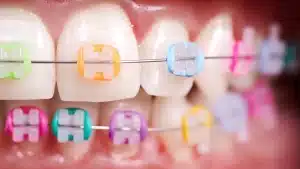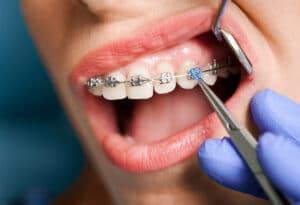
Many people wonder, “Are braces worth it?” Orthodontic treatment is a commitment, and it’s natural to question if the time, cost, and effort will pay off. Braces do more than straighten teeth—they can improve oral health, boost confidence, and correct bite issues. But the decision depends on several factors.
Braces aren’t just for kids or teens. More adults are choosing orthodontic treatment to fix long-standing dental concerns. The benefits can last a lifetime, but it’s important to weigh the pros and cons before starting treatment. Find out why people get braces, their benefits, costs, and what the experience involves.
Why Do People Get Braces?
 Braces are used for more than just cosmetic reasons. Many people need them to correct dental issues that affect everyday life. Here are some common reasons why orthodontists recommend them:
Braces are used for more than just cosmetic reasons. Many people need them to correct dental issues that affect everyday life. Here are some common reasons why orthodontists recommend them:
Misaligned or Crooked Teeth
- Teeth that are crowded or spaced unevenly can make brushing and flossing difficult.
- Poor alignment may increase the risk of cavities and gum disease.
- Straight teeth contribute to a more balanced and even bite.
Bite Problems (Overbite, Underbite, Crossbite, Open Bite)
- A misaligned bite can cause excessive wear on certain teeth.
- Some bite issues lead to jaw pain or difficulty chewing.
- Fixing a bite problem can prevent long-term complications like TMJ disorders.
Speech or Chewing Difficulties
- Some people experience speech impediments due to improper tooth positioning.
- A misaligned bite can make it harder to chew food properly.
Jaw Pain or TMJ Issues
- Jaw misalignment can contribute to chronic pain and discomfort.
- Braces can help distribute pressure evenly across teeth and reduce strain on the jaw.
Aesthetic Concerns and Confidence Boost
- Many people feel self-conscious about their smile.
- Straightening teeth can lead to improved self-esteem.
- Braces provide long-term benefits that can enhance both appearance and function.
Deciding on braces depends on personal needs and goals. For some, it’s about improving dental health. For others, it’s about achieving the smile they’ve always wanted.
The Benefits of Getting Braces
Braces do more than improve the look of your teeth. They also contribute to better oral health, comfort, and overall well-being. If you’ve been asking, “Are braces worth it?” consider these key benefits.
Improved Oral Health
- Straight teeth are easier to clean, reducing plaque buildup.
- Lower risk of cavities and gum disease due to better brushing and flossing access.
- Proper alignment prevents excessive wear on certain teeth, protecting enamel.
Better Bite Function
- Braces help distribute bite pressure evenly, preventing unnecessary strain.
- Misaligned teeth can cause jaw discomfort or uneven chewing, which braces can correct.
- Reducing stress on the jaw lowers the risk of developing TMJ disorders.
More Confidence in Your Smile
- Many people feel more comfortable smiling after completing treatment.
- A straight smile can positively impact self-esteem in personal and professional settings.
- Braces help create a balanced, symmetrical look that lasts a lifetime.
Long-Term Benefits
- Properly aligned teeth reduce the chances of future dental problems.
- Less risk of chipping or cracking due to uneven pressure on certain teeth.
- Fewer headaches and muscle strain from misaligned jaw positioning.
Braces require patience, but the improvements in both appearance and health make the process worthwhile for many people. The decision comes down to what matters most to you—health, function, or confidence in your smile.
The Cost of Braces: Is It Worth It?
 Cost is one of the biggest concerns when deciding on orthodontic treatment. Many people ask, “Are braces worth it?” when considering the financial commitment. The answer depends on the type of braces, insurance coverage, and long-term benefits.
Cost is one of the biggest concerns when deciding on orthodontic treatment. Many people ask, “Are braces worth it?” when considering the financial commitment. The answer depends on the type of braces, insurance coverage, and long-term benefits.
Average Cost of Braces
The price of braces varies based on the treatment type and complexity. Here’s a general cost breakdown:
- Traditional Metal Braces: $3,000 – $7,000
- Ceramic Braces: $4,000 – $8,000
- Lingual Braces (Placed Behind Teeth): $8,000 – $10,000
- Invisalign or Clear Aligners: $3,000 – $7,500
Prices may be higher for severe misalignment or extended treatment time.
Does Insurance Cover Braces?
- Some dental insurance plans cover a portion of orthodontic costs, especially for minors.
- Many orthodontists offer flexible payment plans to make treatment more affordable.
- Health savings accounts (HSAs) and flexible spending accounts (FSAs) can help with costs.
Are Braces a Long-Term Investment?
- Straight teeth reduce the risk of costly dental procedures later, like fillings, crowns, or extractions.
- Proper alignment prevents excessive wear on teeth, helping them last longer.
- Investing in braces now can save money on future dental and medical expenses.
The cost of braces may seem high, but the long-term benefits often outweigh the expense. Many patients find that improved oral health, comfort, and confidence make treatment worth it.
The Braces Experience: What to Expect
Braces require time, adjustments, and commitment. Knowing what to expect can make the process easier. If you’re wondering, “Are braces worth it?” understanding the treatment journey can help you decide.
1. Consultation and Treatment Planning
- The orthodontist examines your teeth, takes X-rays, and discusses treatment options.
- A custom treatment plan is created based on your needs and goals.
- Some patients may need tooth extractions or spacers before getting braces.
2. Getting Braces Put On
- The orthodontist cleans and preps the teeth before attaching brackets.
- A special adhesive secures the brackets, and wires are placed to guide movement.
- The process takes about one to two hours and is painless, but mild discomfort may follow.
3. Adjustments and Progress
- Braces are tightened every 4–8 weeks to shift teeth gradually.
- Some discomfort is normal for a few days after each adjustment.
- Patients must follow dietary guidelines to avoid damaging brackets and wires.
4. Daily Care and Maintenance
- Brushing and flossing require extra attention to prevent plaque buildup.
- Orthodontists recommend avoiding sticky, hard, or chewy foods.
- Wax can help ease irritation from brackets and wires.
5. Completing Treatment and Wearing a Retainer
- Once teeth are in the right position, braces are removed.
- A retainer helps keep teeth from shifting back over time.
- Wearing a retainer as instructed is essential for maintaining results.
Braces take patience, but the improvements in function, comfort, and appearance are worth the effort. The experience varies for everyone, but with proper care, the results can last a lifetime.
Are Braces Worth It for You? Factors to Consider
Deciding on braces is a personal choice. Some people need them for dental health, while others want a straighter smile. If you’re asking, “Are braces worth it?” consider these factors before making a decision.
1. The Severity of Your Dental Issues
- Minor misalignment may not require full braces—clear aligners or retainers could be an option.
- Severe crowding, bite issues, or jaw problems often need braces for correction.
- An orthodontist can determine the best treatment based on your specific needs.
2. Commitment to Treatment
- Braces require regular check-ups, adjustments, and daily care.
- Some foods need to be avoided to prevent damage to brackets and wires.
- Patients must wear a retainer after treatment to maintain results.
3. Budget and Insurance Coverage
- The cost of braces varies, and not all insurance plans provide coverage.
- Many orthodontists offer payment plans to make treatment more affordable.
- Consider long-term savings—braces can prevent expensive dental procedures later.
4. Age and Lifestyle
- Braces are common for kids and teens, but adults also benefit from treatment.
- Adults may prefer less noticeable options like ceramic braces or Invisalign.
- Consider how braces fit into your daily routine and professional life.
5. Alternative Treatment Options
- Invisalign and other clear aligners work well for mild to moderate cases.
- Some minor misalignment issues can be managed with retainers.
- An orthodontist can explain the differences between treatment options.
Braces are a long-term investment in your smile and oral health. Weighing these factors can help you decide if treatment is right for you.
FAQs About Braces
People often have concerns before starting orthodontic treatment. Here are answers to some of the most common questions.
How long does treatment usually take?
- The average treatment time is 18 to 24 months, but it varies based on the severity of misalignment.
- Some cases take as little as 12 months, while complex cases may require 3 years or more.
- Following the orthodontist’s instructions can help keep treatment on schedule.
Are braces painful?
- Getting braces put on does not hurt, but mild discomfort is normal for a few days.
- Tightening appointments can cause soreness, which usually fades within a week.
- Orthodontic wax, over-the-counter pain relievers, and soft foods can help with irritation.
Can adults get braces too?
- Yes, more adults than ever are choosing orthodontic treatment.
- Options like ceramic braces or Invisalign make treatment less noticeable.
- Straightening teeth can improve oral health and confidence at any age.
What happens if I don’t wear my retainer after treatment?
- Teeth naturally shift over time, especially right after braces are removed.
- Not wearing a retainer can lead to teeth moving out of place, requiring additional treatment.
- Retainers are essential for maintaining results long-term.
Braces come with an adjustment period, but they offer lasting benefits. If you still have concerns, an orthodontist can provide personalized answers based on your situation.
Final Thoughts: Are Braces Worth It?
Braces require time, effort, and financial commitment, but the benefits often outweigh the challenges. If you’ve been asking, “Are braces worth it?” the answer depends on your dental health, goals, and lifestyle.
A straighter smile improves more than just appearance. It makes daily oral care easier, reduces the risk of dental issues, and improves bite function. While treatment can take months or even years, the long-term benefits last a lifetime.
The best way to know if braces are right for you is to schedule a consultation with an orthodontist. They can assess your needs, discuss options, and help you decide on the best path forward. Investing in your smile now can lead to better oral health and confidence for years to come.
Take the First Step Toward a Confident, Healthier Smile
Choosing braces is a big decision, but you don’t have to make it alone. At Scantlebury Orthodontics, we understand the concerns that come with orthodontic treatment, and we’re here to make the process comfortable, reassuring, and rewarding. If you’ve been wondering, “Are braces worth it?” a consultation with Dr. Sophia Scantlebury can help you find the right answer for your unique needs.
Dr. Scantlebury’s expertise, combined with her caring and gentle approach, ensures that every patient receives personalized attention and a treatment plan designed for long-term success. With state-of-the-art technology and a welcoming environment, she and her team focus on making each visit a positive experience.
Your smile and oral health deserve expert care. Contact Scantlebury Orthodontics today to schedule your consultation and take the first step toward the benefits of a well-aligned smile.
